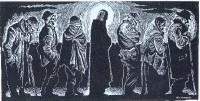

Karen House Catholic Worker
 |
Karen House Catholic Worker |
The RoundTable The Poor Are Still With Us Winter 2005 Major Articles
|
Download Entire Issue by Clicking Image Above (large file - takes a minute!) |
|||
Karen House: 1840 Hogan St. Saint Louis, MO 63106 Contact Us: 314.621.4052 |
Regular Features
|
Why This Issue: I watched about 20 minutes of the third Presidential debate before fleeing in despair. The title of the demonstration at the St. Louis debate mirrored my thoughts, "Where's the Debate?" In the wealthiest and most powerful nation on earth, increasing millions are without access to health care, safe housing, and decent education. The whole of the debate however, both publicly and presidentially, seemed confined to only a few issues.
The most obvious issue seemed to be not whether it was a good idea to keep waging war on the world, but over who would do it better. Watching the acquiescent nightly news reports filled with terror alerts, health tips and sports, our community wondered if perhaps poverty had been alleviated.
Meanwhile, here at Karen House, we still get 20-30 calls a day from women looking for shelter that we have to turn away. Like most shelters across the country, our food pantry is usually low and our beds (and often first and second couches) are always full. We've seen public services for the women who live at Karen House slashed. Due to funding cuts, the best course for initiating mental health care for a single, uninsured homeless woman is an expensive and wasteful ER visit, rather than with a primary care doctor. We see the need growing, the overcrowding increasing, and the despair spreading.
And so, dear reader, we bring you this issue on poverty as a collective reminder to ourselves that the poor are indeed still with us. Several of our articles paint a picture of poverty in the United States in 2004. We note that the dominant characteristic of poverty seems to be a stark lack of access- to decent education, to reasonable transportation, to healthy food, to financial opportunities. Mary Ann McGivern writes about poverty's roots, including the unbridled capitalism and militarism that kills the poor. In the spirit of personalism, Marc Leonard interviews three Karen House guests who share their stories, while Melissa Brickey describes several friends who are making their way, with support and community, through the cycle of poverty. Our regular features of RoundTable Talk, From Karen House and From Abroad cover topics from the Palestine occupation, to community happenings, to animal abuse, while From Little House offers a manifesto of sorts on the subject of immigration.
The two-thirds of the world's people that live in poverty and the guests of Karen House don't need to be reminded of the maldistribution of the world's resources. It is we who have the (often unacknowledged) privilege of race, class, gender, ethnicity and sexual orientation who require the loving but firm reminder of that privilege and its consequences. The poor, those without access, are still with us. It is up to us to transform our unsustainable lifestyles, to work for both justice and charity, and to decrease our unbridled resource consumption. It is up to us to indeed shift the debate itself. -Jenny Truax |
The RoundTable is 24 pages long. To download, you'll need the most recent version of Adobe Acrobat. Download Adobe Acrobat 8 here (it's easy AND free!)
Search all of the RoundTable issues for an author, subject or title here: |